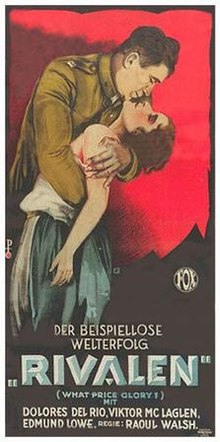What Price Glory? *** (1926, (Victor McLaglen, Edmund Lowe, Dolores del Rio) – Classic Movie Review 7919

Director Raoul Walsh’s 1926 silent comedy-drama war film classic What Price Glory? (based on a 1924 long-running Broadway play by Maxwell Anderson and Laurence Stallings) stars Victor McLaglen and Edmund Lowe as Captain Flagg and Sergeant Quirt, who head off to the French front during World War One and battle for the affections of sweet mademoiselle Charmaine de la Cognac (Dolores del Rio).
This hugely popular, still famous and amusing silent movie took $2 million at the box office, had three sequels, and was remade by John Ford in 1952 with James Cagney and Dan Dailey as What Price Glory. Malcolm Stuart Boylan, founder of the U S Coast Guard Auxiliary, was title writer.
The film is famous but also infamous because the characters can be seen speaking profanities not shown in the inter-titles but detectable by lip readers. The studio fielded calls and letters from enraged Americans, including deaf and hearing impaired people offended by the profanities between Flagg and Quirt.

Edmund Lowe, Dolores del Río and Victor McLaglen in What Price Glory?
Raoul Walsh directed sound sequels in 1929, The Cock-Eyed World, and in 1931, Women of All Nations, and there was a further sequel in 1933, Hot Pepper, with Lowe and McLaglen, who played two similar US Marine characters in the RKO Radio Pictures film Call Out the Marines (1942).
Also in the cast are William V Mong, Phyllis Haver, Elena Jurado, Leslie Fenton, Barry Norton, Sammy Cohen, Ted McNamara, August Tollaire, Mathilde Comont and Pat Rooney.

What Price Glory? Is directed by Raoul Walsh, runs 116 minutes, is produced and distributed by Fox Film Corporation, is written by James T O’Donohoe and Malcolm Stuart Boylan (titles), based on the play by Maxwell Anderson and Laurence Stallings, is shot in black and white by Barney McGill, is produced by William Fox and is scored by Maurice Baron and Erno Rapee.
It was released in the US as a silent film by Fox Film Corporation on 23 November 1926. On 21 January 1927, Fox re-released it with musical score and synchronised sound effects in their new MovieTone sound system. A short film of singer Raquel Meller was shown before it at the Sam H Harris Theater in New York City. The near-synchronised short film was the first public presentation of a film in the Fox MovieTone sound-on-film system.
© Derek Winnert 2018 Classic Movie Review 7919
Check out more reviews on http://derekwinnert.com

